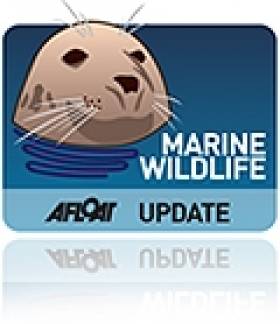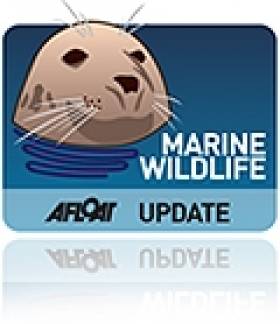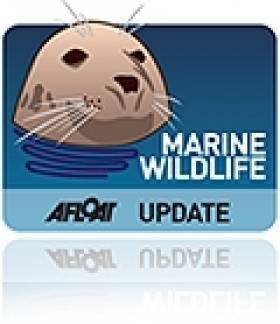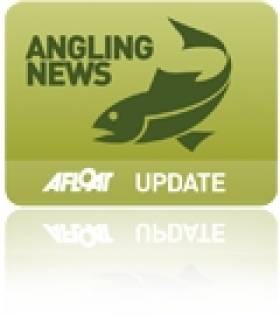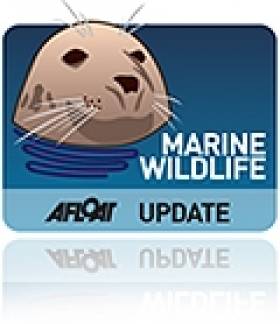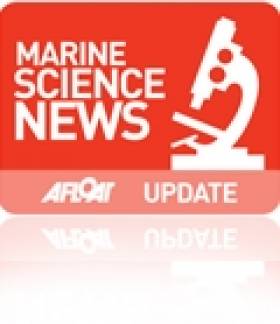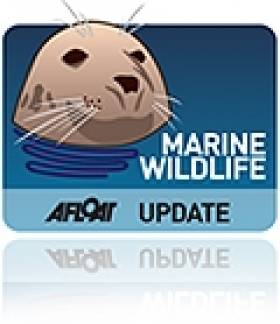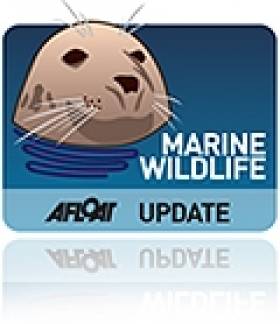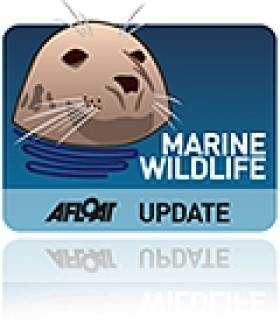Displaying items by tag: marine wildlife
#MarineWildlife - The Irish Seal Sanctuary has told Radio Kerry that it is no longer looking for the culprits behind the shocking sea beheadings in Dingle last summer.
As reported on Afloat.ie one year ago, staff at the Dingle Wildlife and Seal Sanctuary were sickened by the gruesome sight of two baby seal heads nailed to signs outside the facility.
Johnny Woodlock of the Dingle Seal Sanctuary later claimed that the horrific discovery was part of a "swing in activity in recent months" where dead seals were found on beaches around the country with "apparent gunshot wounds".
However, the founder of the Irish Seal Sanctuary has said that the group is no longer actively seeking the perpetrators of the barbaric Dingle incident.
"It's not a high priority for me any longer," said Brendan Price of the Irish Seal Sanctuary, who added that rewards for information are "posted from time to time when incidents like this have occurred".
Price continued: "I wouldn't be looking for some kind of public atonement. I don't think it's helpful to keep rewards up any longer, and I'm sure that it will not happen again."
Algal Bloom On East Coast Beaches Under Observation
#AlgalBloom - The Marine Institute says it is currently monitoring an algal bloom on beaches on the east coast of Ireland as a part of its Phytoplankton Monitoring programme.
The bloom was detected two weeks ago using satellite images and information provided by the Environmental Protection Agency (EPA) and Wexford County Council.
The Marine Institute has analysed a number of samples from the algal bloom and has identified the species as Phaeocystis pouchetii, a common species that has caused blooms along the east coast several times in previous years. The species causes discolouration of the water, and foaming on the beach in windy conditions.
Joe Silke of marine environment and food safety services at the Marine Institute emphasised that the species is not directly harmful to humans either through swimming or from consuming fish that have been exposed to the bloom.
Beaches remain safe despite any discolouration of water, though the production of foam, and in some extreme cases anoxia, can result in marine organism mortalities.
However, unlike last summer's destructive algal bloom on the west and north coasts that was responsible for significant fish and shellfish kills from Galway to Donegal, fish mortalities caused by this particular species in previous Irish blooms have not been observed, as wild fish tend to avoid the bloom. This may explain the low catches reported by sea anglers on the east coast in recent weeks.
Several fishermen have also reported clogging of nets in recent weeks, which may be caused by the decaying bloom sinking to the seafloor.
Algal blooms are commonly detected over the summer months in coastal areas. It is likely that this particular bloom will dissipate in in the next week or so and will be replaced with the normal succession of microalgae that form the bottom of the food chain in the sea.
Howth Coast Guard picked up a baby Porpoise stranded in shallow water off Portmarnock beach, Dublin yesterday and brought it one kilomretre back out to sea to safety.
Howth Coastguard was requested to assist the Irish Whale and Dolphin Group (IWDG) yesterday afternoon at Portmarnock beach in North Dublin as the youtube video above depicts.
A Coast Guard team from Howth station travelled by boat and jeep to the location and meet with the IWDG representative.
The decision was made to bring the baby mammal who was beached back to the sea in the hope it would swim away.
The boat team lead by coxswain Jaimie Blandford carefully placed the mammal on board and brought it a kilometre out into the open water.
Porpoises are very similar to dolphins but have shorter beaks and are seen in the Irish Sea with the same swimming patterns as dolphins.
The porpoise now named "Fungie Beag" was placed in the water, after some initial hesitation it successfully returned to the water and swam back into the Irish Sea, hopefully returning to its family.
#Angling - From today 1 June, Northern Ireland's anglers are banned from selling salmon caught in rivers under new measures from the Legislative Assembly.
As BBC News reports, Minister for Culture, Arts and Leisure Carál Ní Chuilín said that the new rules are "the first step in a series of conservation measures aimed at protecting stocks of the iconic Atlantic salmon".
The rod and line catch sale ban is intended to encourage the practice of 'catch and release' which is set to become mandatory next year, and also brings NI legislation into line with the rest of Britain and the Republic of Ireland.
It comes months after the shocking news that just three out of every 100 wild salmon returned to Northern Ireland's rivers in 2011, prompting concerns that the species has declined to "Dodo levels".
Moves have already been made to control the commercial offshore netting of salmon in order to boost their numbers in the North's waterways.
Another threat to salmon numbers is the rise of invasive species in Northern Ireland's waterways, which as the News Letter reports have cost the economy more than £46 million a year, according to Environment Minister Alex Attwood.
Highlighting the risk to NI's marine wildlife and plantlife, as well as fisheries and agriculture, the minister said "increasing awareness of the threat of invasive species and the need to tackle them is key to achieving success".
A new strategy by the Legislative Assembly will involve partnerships between government, the community and environment groups "working in tandem" to deal with the problems caused by invasive species such as the Japanese sea squirt, detected in Strangford Lough last year.
Beaked Whale Strandings Total 3 For May
#MarineWildlife - Another beaked whale stranding has been recorded on the Irish coast just weeks after two of such creatures were found in Donegal.
A ranger with the National Parks and Wildlife Service (NPWS) made the discovery at Aillebrack in Co Galway on the evening of 27 May.
The 5m carcass of a female - like the female and juvenile found in the northwest - is thought to be either a True's or Sowerby's beaked whale.
Mick O'Connell, strandings officer with the Irish Whale and Dolphin Group (IWDG), says the latest stranding "raises new questions", with suspicion that its death may be linked to the face of the Donegal pair earlier this month.
As previously reported on Afloat.ie, beaked whales are a rare occurrence in Irish waters, with the last record before this month' stranding made in 2009.
Marine Institute To Be Centre of Global Marine Research
#MarineScience - Galway Bay FM reports that the Marine Institute in Galway is to become one of the world's leading marine research centres.
The news comes in the wake of a groundbreaking deal signed in Galway on Friday afternoon (24 May) between the EU, the US and Canada to join forces on Atlantic Ocean research, as previously reported on Afloat.ie.
All partners have agreed to commit to funding to study the interplay of the Atlantic with the Arctic Ocean, and discover ways that research on the oceans and marine wildlife can contribute to scientific advances in other areas.
Meanwhile, a monitoring system for waste waters is among the projects that will benefit from a near €1 million in funding from the Science Foundation.
Research Minister Seán Sherlock announced the funding for projects at NUI Galway that is hoped to deliver "commercialisation of research in a range of areas".
Dolphins 'Say Thank You' After Fish Farmer Rescue
#MarineWildlife - Two dolphins saved from stranding on a beach in Donegal leapt from the water "as if to say thank you" after their rescue by a local fish farmer.
The Belfast Telegraph reports that salmon farmer Shea Coyle and his father Michael acted quickly after noticing what at first looked like two upturned surfboards on Downings beach near Fanad.
But what looked from afar like surfboard fins turned out to be the fins of two dolphins that had become trapped in the sand.
Shea described how the dolphins were "trying desperately to wriggle free" before he leant a hand to heave them back into the water.
"After about 10 minutes I got one dolphin safely out into deeper water and he stayed there whilst I got to work on the other."
Once the second dolphin was free, the pair "just took off" - and were later seen by the Coyles from a nearby peer, giving what might just have been a show of thanks.
The happy story in Donegal occurred not long after a series of dolphin and whale strandings in the northwest described as "unusual" by the Irish Whale and Dolphin Group (IWDG).
'Beach Safari' At Salthill Ahead Of Galway Sea Festival
#MarineWildlife - Young and old alike are invited to join a 'beach safari' from the lifeguard hut Grattan Beach in Salthill at 11.30am on Sunday 26 May, ahead of the first Galway Sea Festival.
Marine wildlife experts such as Amy Lusher of GMIT's Marine and Freshwater Research Centre and Dr Nóirín Burke of the Galway Atlantaquaria will be on hand to provide insights into an often ignored world of plants and animals, as the Galway Independent reports.
“The shore can sometimes appear to be devoid of wildlife, but when you start to look closely, there is a wonderful amount of activity going on - in the sand, under the rocks and in the rock pools," said Dr Burke.
“Grattan Beach is such an amazing resource to have on our doorstep here in Galway. Just a few hundred metres from the footpath where people walk and jog you can enter a habitat where life is completely different from our own."
A further chance to discover more about this secret world of the marine habitat will be available at the Galway Atlantaquaria's 'Family Funday' on 2 June in conjunction with the city's Galway Sea Festival celebrations.
As previously reported on Afloat.ie, "tens of thousands" of visitors are expected to flock to the City of the Tribes for the first Galway Sea Festival from 31 May till 3 June over the June bank holiday weekend.
#MarineWildlife - A gray whale has been sighted many thousands of miles from its usual Pacific swimming grounds in the South Atlantic.
As Pádraig Whooley writes on the Irish Whale and Dolphin Group (IWDG) website, the whale was spotted in the last week in Walvis Bay, Namibia - only the second ever confirmed sighting of the marine species in the Atlantic Ocean, and the first south of the equator, since records began.
Previously a solitary gray whale was tracked in the Mediterranean in May 2010 from the coast of Israel to Barcelona in north-eastern Spain.
That was the first time a gray whale had been seen anywhere east of the Pacific Ocean following the presumed extinction of the Atlantic gray whale in the 17th century.
Whooley calls the latest sighting "a fascinating discovery" and says it "points strongly towards a dramatic shift in distribution facilitated by climate change.
"This is a timely reminder that we should never assume to know what species occur in our local waters, especially when this species seems to have literally come back from the dead."
New TV Series Unveils 'Secret Life of the Shannon'
#OnTV - Sunday 26 May sees the first of a two-part documentary series on The Secret Life of the Shannon on RTÉ One.
The series will take viewers on a journey along the River Shannon with wildlife cameraman and presenter Colin Stafford Johnson, who spent a year living on the river on a barge, camping on its banks and exploring its tributaries in a traditional canoe.
His quest was to film the natural history of the 340km of the Ireland's longest inland waterway as it has never been seen before - and if the above video is anything to go by, he's done an incredible job.
The Secret Life of the Shannon part of the RTÉ Goes Wild month-long celebration of Ireland's wildlife on television, radio and online.
Episode one will be broadcast on Sunday 26 May at 6.30pm on RTÉ One, with the second episode to follow at the same time on Sunday 2 June.


























